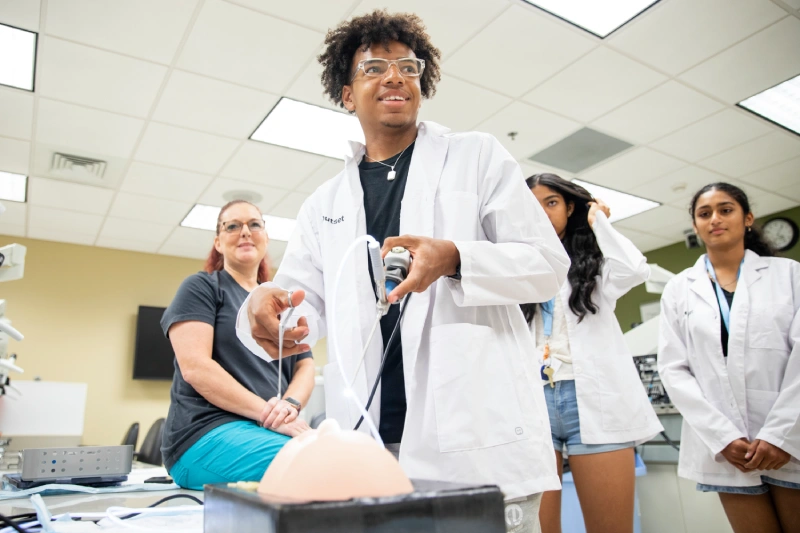Are you passionate about science and health and interested in making a real difference in people's lives? If so, becoming a dentist could be the perfect career for you. As a dentist, you're not just fixing teeth—you’re helping people maintain their overall health and sometimes even spotting early signs of bigger health issues through oral exams.
If you're considering this career, it’s never too early to start planning your path. This guide will walk you through what it takes to become a dentist, from the education and training you'll need to the daily responsibilities and rewards of the job.
Let’s explore how you can start making an impact and shaping your future as a dentist!
What Does a Dentist Do?
Dentistry is about safeguarding oral health in all its forms. Dentists diagnose and treat issues affecting the teeth, gums, and mouth. From filling cavities to performing root canals, crafting dentures, and tackling gum disease, they're on the front lines of healthcare.
But they don't stop at treatment; prevention is a big part of the job. By educating patients on proper oral hygiene, they help keep those smiles bright.
And let's not forget the specialists. Orthodontists align teeth with braces, periodontists focus on gum health, pediatric dentists make the experience kid-friendly, and oral surgeons handle complex surgeries.
Consider the dentist who not only eases a patient's toothache but rebuilds their confidence with a new smile. Or the orthodontist guiding a teen through braces, setting them up for lifelong oral health. These professionals aren't just fixing teeth—they're transforming lives every day.
Education and Training Requirements: How to Become a Dentist
Your journey to become a dentist starts with a strong educational foundation. First things first: earn a bachelor's degree. While there's no required major, loading up on science classes like biology, chemistry, and physics will lay the groundwork you need.
Next up is the Dental Admission Test (DAT). This exam gauges your academic skills and scientific knowledge. A strong score can make all the difference when dental schools review your application.
Dental school itself is a four-year commitment. The first two years are heavy on classroom and lab work, diving into subjects like anatomy and dental materials. Then you shift gears—the final two years focus on clinical experience, where you'll work directly with patients under supervision.
Before you can set up shop, you'll need to pass the National Board Dental Examination, which combines written and clinical assessments. And don't forget to check for any state-specific licensing requirements.
How Long Does It Take to Become a Dentist?
So, you're curious about the time commitment on how to become a dentist? Typically, you're looking at about eight years after high school: four years for your bachelor's degree and another four in dental school.
In undergrad, you'll tackle the prerequisites for dental school—often heavy on the sciences. Then, dental school immerses you in both the theoretical and practical aspects of dentistry, gearing you up for real-world practice.
Some universities offer accelerated programs that combine undergraduate and dental studies, shaving a year or two off the journey. Intense? Yes. But it gets you into your career sooner.
Keep in mind, if you decide to specialize—say, in orthodontics or oral surgery—that will require additional years of residency training. But for general dentistry, eight years is the typical path.
Skills and Qualities Needed to Become a Successful Dentist
Top-tier dentistry isn't just about technical know-how. Sure, you need to understand teeth inside and out, but that's just the start.
Manual dexterity is crucial. You're working in tight spaces, and steady hands make all the difference. Missing a tiny cavity? Not an option. Attention to detail is everything.
But let's talk about soft skills. Communication is huge. Explaining complex procedures in plain language, calming nervous patients—that's all part of the job. Empathy builds trust, and trust keeps patients coming back.
Planning to run your own practice? You'll need some business savvy—management and leadership skills come into play. And remember, the field is always evolving. Staying adaptable and committed to lifelong learning keeps you ahead of the curve.
Blending technical excellence with interpersonal skills? That's the recipe for standing out in the dental field.
Average Dentist Salary
Looking at the financial side? The future's bright. According to the U.S. Bureau of Labor Statistics, dentist employment is projected to grow 5% from 2023 to 2033—a steady pace matching the average for all occupations. An aging population and ongoing research linking oral health to overall health are fueling this demand.
When it comes to earnings, dentists do well. The median annual wage was $170,910 in May 2023. Of course, salaries can vary based on experience, location, and specialization.
Own your practice? You might pull in even more. Specialists like orthodontists and oral surgeons often top the charts. For example, the average annual salary for an orthodontist in the United States is $156,153, according to Salary.com.
Bottom line: Dentistry offers a stable and rewarding career path for those ready to put in the effort.
Challenges and Rewards of the Profession
Like any career, dentistry has its hurdles. The educational journey is long and demanding—at least eight years, which can lead to substantial student debt. The job itself can be physically taxing. You're on your feet, working with precision in tight spaces, which can take a toll over time.
Then there's the weight of responsibility. Patients' health is in your hands, and mistakes can have serious consequences. So, attention to detail and a commitment to continual learning are essential.
But let's talk rewards. The financial benefits are significant. More than that, there's immense satisfaction in improving lives. Relieving pain, restoring smiles, boosting confidence—that's the daily reality.
Want to be your own boss? Running a private practice gives you control over your work environment and schedule. Plus, the profession offers constant intellectual stimulation—no two days are the same.
When you balance it all out, many find that the rewards far outweigh the challenges, making dentistry a fulfilling career choice.
Alternative or Related Careers
Maybe dentistry appeals to you, but you're exploring other avenues. There are plenty of related careers worth considering.
Dental Hygienist
Dental hygienists focus on preventive oral care—cleaning teeth and educating patients on maintaining good oral hygiene. It typically requires an associate degree in dental hygiene, and with a median annual salary of around $84,842, it's a promising path. Plus, demand for hygienists is expected to grow.
Dental Assistant
As a dental assistant, you're the dentist's right hand—assisting during procedures, managing instruments, handling administrative tasks. Entry into this field can be through a certificate or diploma program that lasts about a year. The median salary is approximately $47,933. It's a vital role in any dental practice.
Dental Lab Technician
Enjoy working with your hands? Dental lab technicians craft prosthetics like crowns and dentures. Training can be on the job or through an associate degree program.
Forensic Odontologist
Interested in blending dentistry with law enforcement? Forensic odontologists use dental records to help identify remains and assist in investigations. This specialty requires additional training beyond dental school.
These careers let you dive into the world of dental health without becoming a dentist. Each one plays a crucial role in the bigger picture.
Steps for Teens: How to Become a Dentist
Are you a high schooler with dentistry on your radar? Starting now can give you a real advantage. Here's how to get rolling:
Focus on Science and Math Courses
Load up on classes like biology, chemistry, physics, and math. Taking Advanced Placement (AP) or honors courses strengthens your college applications and prepares you for the rigorous science courses ahead.
Develop Strong Study Habits
Grades matter. Aim for a high GPA by honing your study skills now. These habits will serve you well through college and beyond.
Prepare for Standardized Tests
Invest time in preparing for the SAT or ACT. Strong scores can open doors to better colleges and scholarship opportunities.
Gain Hands-On Experience
Shadow a local dentist to get a firsthand look at the profession. Volunteering at dental clinics or hospitals not only builds your resume but also helps confirm your interest in the field.
Join Relevant Clubs and Activities
Participate in science clubs, pre-dental societies, or health-related extracurriculars. Leadership roles in these organizations can make your college applications stand out.
Work on Your Communication Skills
Dentists need to explain complex information clearly and put patients at ease. Join debate clubs, volunteer, or find other ways to build these skills.
Start Researching Colleges
Look for universities with strong pre-dental or science programs. Some schools offer accelerated programs that combine undergraduate studies with dental school.
By taking these steps now, you'll be well-prepared when it's time to apply to dental school. Plus, you'll have a clearer understanding of what to expect in this rewarding career.
Explore a Dentistry Career with Outset
Are you curious about the day-to-day life of a dentist? Outset offers hands-on experiences across healthcare specialties, including dentistry. You’ll have the chance to meet experienced dentists who can share career insights. If you're interested, apply now on our website!
Final Thoughts
Deciding on how to become a dentist isn't just choosing a career—it's embracing the opportunity to make a meaningful impact on people's lives. From relieving pain to restoring confidence with a new smile, the rewards are profound. Dentistry offers not just financial stability but also personal fulfillment and endless opportunities for learning.
As you embark on this journey, remember that every step brings you closer to joining a profession that values skill, compassion, and innovation. Embrace the challenges, seek out experiences, and stay committed to your goals. The path isn't easy, but the destination is absolutely worth it.
Resources & References
American Dental Association (ADA)














.png)








